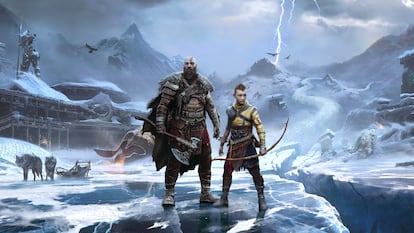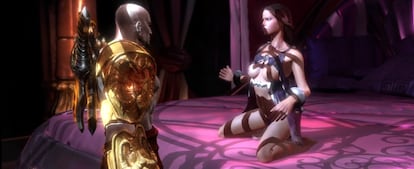‘God of War’ reinvented: From sex games with Aphrodite to deconstructing masculinity
‘Ragnarök,’ the latest title in the saga, follows in its predecessor’s footsteps, changing the mindless action for an exploration of sensitivity and humanity

Let’s start at the beginning: God of War is one of the most famous sagas in the world of video games. In 2005, the first installment introduced Kratos, Ghost of Sparta, a mortal embarked on a bloody crusade to avenge his family by defeating – and replacing – Ares, Greek God of War. Its canonical sequels, God of War 2 (2007) and God of War 3 (2010), along with other additional games, expanded the franchise’s mythology while diminishing the Greek pantheon: in each installment, more and more gods met their fate at the hands of the relentless Kratos.
The game was quite the guilty pleasure, full of blood, guts and destruction; all made possible thanks to the Swords of Chaos, the main character’s legendary weapon. A hack and slash game par excellence that also worked as the perfect alpha male power fantasy: Kratos was a muscular guy who knew no mercy, a rather flat character who seduced goddesses and killed weak Athenians almost simultaneously. The male power fantasy became fully realized in a mini-game of the third installment: at one point, in Aphrodite’s palace, Kratos found the Greek goddess frolicking on a gigantic bed with two naked young women. The goddess invited him to share the bed with her and, if the player agreed, a curious mini-game began in which the camera moved to one side and the player had to press buttons in a kind of sexual choreography punctuated by moans. Aphrodite ended up dizzy with satisfaction, and the player’s life bar was restored. With examples like this, it was hard to defend the idea that video games had been moving away from sexist stereotypes.

But then, in 2018, a miracle happened. God of War returned to our lives with a different tone. Kratos now lived in the north, surrounded by Norse gods. He was older and clumsier, more human and fallible. And most importantly, Kratos had a son, Atreus, around whom his entire existence revolved. His goal was no longer to seek revenge, but to protect him; instead of being him alone against the world, now there was an indissoluble duo. Meanwhile, the pacing of the game itself shifted to a more mature beat. Combat was no longer schizophrenic and fast-paced, but calculated and brutal. The game embraced a new gravity and a new meaning.
That installment, whose unnumbered nomenclature was a clear declaration of intent in a franchise that sought to reinvent itself, achieved the seemingly impossible. What used to be rage, strength, revenge and unbridled action was now conveyed through something as unthinkable as a father’s love for his son. The newfound sensitivity of the formerly mindless warrior moved the world, and the title won the Game of the Year award. This evolution was greatly influenced by the life experience of the game’s director, Cory Barlog, who explained that his own fatherhood brought a new shape and identity to the game.
Now, God of War: Ragnarök, the sequel to the 2018 game, released on Wednesday, November 9, takes the lessons of its predecessor and goes a step further, adding new playable elements, transformations and weapons. Like the previous game, it uses sequence shots, without cuts, additional drama or loading times. And while it is true that it is a game built more for PS4 than for PS5, it is a technical and narrative feat (with a story that is much more focused on Atreus’ personal growth), with superb work by the actors and musicians. In addition, the female characters gain new weight and continue to move away from sexist clichés. It remains to be seen if this sequel is as successful as the predecessor, but what is certain is that we are before one of the great games of the year.
The saga’s shift is no small feat: without much fuss or acts of contrition, an adrenaline-pumping, brainless and emotionally harmless franchise became a defense of paternity and the sensitivity that comes with it. But the narrative prowess behind the new game deserves a special mention: a franchise about the gods ends up has turned, almost be magic, into a story about the search for humanity.
Tu suscripción se está usando en otro dispositivo
¿Quieres añadir otro usuario a tu suscripción?
Si continúas leyendo en este dispositivo, no se podrá leer en el otro.
FlechaTu suscripción se está usando en otro dispositivo y solo puedes acceder a EL PAÍS desde un dispositivo a la vez.
Si quieres compartir tu cuenta, cambia tu suscripción a la modalidad Premium, así podrás añadir otro usuario. Cada uno accederá con su propia cuenta de email, lo que os permitirá personalizar vuestra experiencia en EL PAÍS.
¿Tienes una suscripción de empresa? Accede aquí para contratar más cuentas.
En el caso de no saber quién está usando tu cuenta, te recomendamos cambiar tu contraseña aquí.
Si decides continuar compartiendo tu cuenta, este mensaje se mostrará en tu dispositivo y en el de la otra persona que está usando tu cuenta de forma indefinida, afectando a tu experiencia de lectura. Puedes consultar aquí los términos y condiciones de la suscripción digital.









































